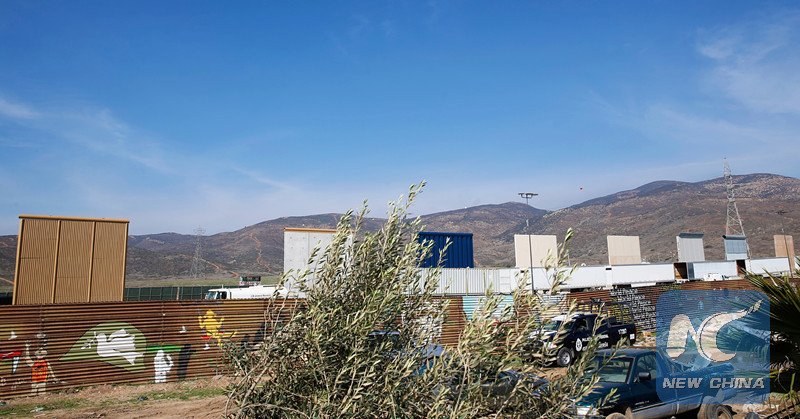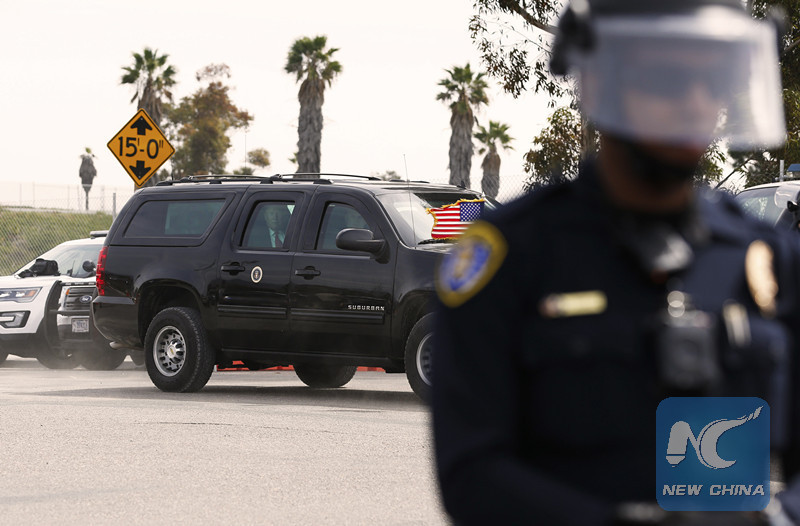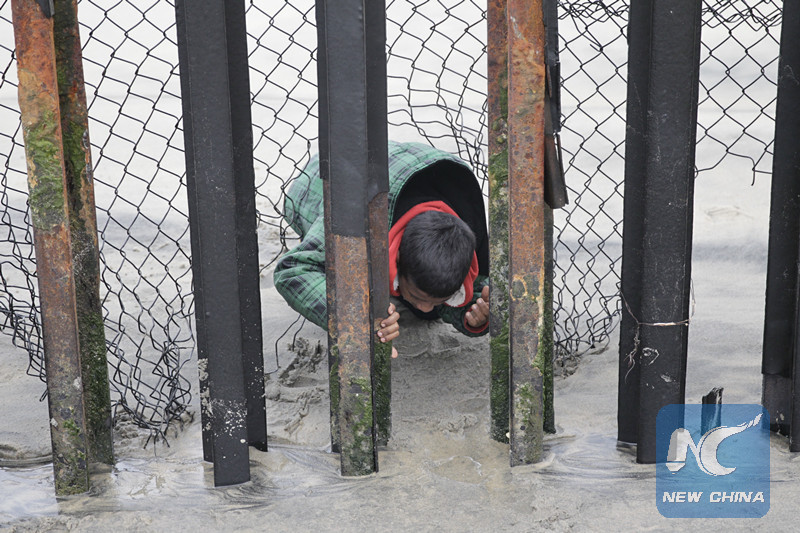
Border wall prototypes are seen behind the current border fence in this picture taken from the Mexican side of the Mexico-U.S. border in Tijuana, Mexico on March 12, 2018. When other countries are building bridges to facilitate transportation and communication, the United States, to the contrary, is building a wall that purports to prevent migrants from entering the country but will end up isolating itself from the world. (Xinhua/Li Ying)
by Xinhua writers Sun Ding, Cui Yuanlei, Chen Shile
SAN DIEGO/MEXICO CITY, March 15 (Xinhua) -- Chanting "Build bridges not walls," hundreds of protesters in downtown San Diego, California, greeted Donald Trump's maiden trip as U.S. president to the "Golden State" bordering Mexico.
When other countries are building bridges to facilitate transportation and communication, the United States, to the contrary, is building a wall that purports to prevent migrants from entering the country but will end up isolating itself from the world.
FULFILL PROMISES
Trump on Tuesday inspected eight nine-meter-tall prototypes in San Diego for the "big beautiful border wall" he wants to build to separate the United States from Mexico.
"If you didn't have walls over here, you wouldn't even have a country," Trump said, in an apparent attack at critics targeting his commitment to the wall.
Upon taking office in January 2017, Trump signed an executive order for the immediate construction of a wall along the 3,200-km-long border with Mexico, only a third of which has been equipped with fencing to prevent the entrance of people and vehicles.
Construction began in September of the eight large prototypes at a cost of between 2 million and 4 million U.S. dollars each.
The move underscores that Trump is serious about building the wall, despite doubts among some observers and analysts, many of whom believed the plan was too radical, and simply an empty campaign promise.
"Building a wall along the Mexican border was one of Trump's primary campaign promises, so he is devoting a lot of time pushing this initiative as a way to demonstrate he is doing what he said he would do," Brookings Institution Senior Fellow Darrell West said.
Some support the wall, arguing that it is high time the United States protected its own borders.

U.S. President Donald Trump leaves the U.S.-Mexico border after inspecting border wall prototypes in San Diego, the United States, on March 13, 2018. When other countries are building bridges to facilitate transportation and communication, the United States, to the contrary, is building a wall that purports to prevent migrants from entering the country but will end up isolating itself from the world. (Xinhua/Li Ying)
"Updating the U.S. border security infrastructure is long overdue and President Trump has promised to change that," said Ana Quintana, a Latin America policy analyst with Heritage Foundation.
"There is a direct body count associated with threats facing the U.S. homeland from transnational criminal organizations and illicit narcotics traffickers. President Trump is simply fulfilling his obligations by responding to these threats," Quintana said.
A SYMBOL OF ISOLATIONISM
In his presidential campaign, Trump preached building the wall to keep out rapists, criminals and drug traffickers, though in reality most migrants are simply looking for work.
Manuel Cruz, a local taxi driver in Tijuana, said that workers could only earn six dollars per day in Tijuana, but they could be paid double per hour working in landscaping, shipyard maintenance, housekeeping or as hotel maids in San Diego.
"They are not taking away American jobs like the president has said," a San Diego resident said, refuting Trump's narrative. "They are doing jobs that Americans wouldn't do."
"(The wall) is an easy, symbolic scapegoat for many who lost their manufacturing jobs to the forces of technological automation and the competitive global market," Seattle attorney and Washington insider David Richardson said. "The wall said: keep out competition."
For Silvestre Villegas Revueltas, a professor with the Historical Research Institute of the National Autonomous University of Mexico, Trump's border wall symbolizes the rise of protectionism in the United States.
Mexico is America's third largest trading partner, with about 80 percent of its exports destined for the U.S. market, according to the U.S. Department of State.
Trump's trade protectionism will harm U.S. economic interests that benefit from the integration of Mexican and U.S. businesses, Revueltas said.

A boy tries to squeeze through the border fence in Playas de Tijuana, Mexico, in this Feb. 6, 2017 file photo. When other countries are building bridges to facilitate transportation and communication, the United States, to the contrary, is building a wall that purports to prevent migrants from entering the country but will end up isolating itself from the world. (Xinhua/Dan Hang)
California, the U.S. state where the largest number of Mexicans live, is prosperous because it welcomes migrants and innovators from around the world, said its governor, Jerry Brown.
Holding a banner that reads "We are all immigrants," Kathleen Rooney, a local retiree living in San Diego, said that building a wall is a bad idea because the U.S. and Mexico "really rely on each other a lot."
That Trump's brand of isolationism has found so much support is surprising given America's ethnic diversity and history as a cultural melting pot as well as its global influence, Eduardo Arroyo Laguna, director of Peru's College of Sociologists, said.
"Amazingly, the world's dominant power, the United States, is proposing a national policy to protect itself against globalization," said Laguna, "which is a policy of open doors and open borders."
EFFECTIVENESS QUESTIONED
Opposition to the wall appears to be growing.
One concern is the great cost. The Trump administration is seeking 18 billion U.S. dollars for the construction of the wall for the next 10 years to add 509 km of new barriers and replace old fencing along 655 km, despite the fact that there is no clear funding from Congress for the project.
Trump has insisted that Mexico will reimburse the United States for the planned border wall, a claim that has been denied by Mexico City and frozen the two neighbors' ties.
There are also concerns about potential environmental risks the wall will bring.
"The wall is going to be a disaster for different reasons ... and one of the ways is that it is going to be a disaster at the environmental level," John Knox, the UN's special rapporteur on human rights and the environment, told a forum in November in Mexico City.
A solid physical barrier could interfere with the movement and survival of regional species, he said. "I hope the wall will not be built."
In late April, a U.S. conservation group and Congressman Raul Grijalva filed a lawsuit for environmental damages of the border wall.
"We filed the lawsuit in consideration of all perspectives of environment," said Randy Serraglio, with the Arizona-based Center of Biological Diversity, adding the lawsuit called for an in-depth investigation of the potential environmental impact.
"Some areas within 50 miles (about 80 km) of the U.S.-Mexico border have been identified as the 'critical habitat' for at least 25 species by the U.S. Fish and Wildlife Service," according to a report by U.S. broadcaster KTAR News.

A woman takes part in a march to protest against border wall in San Diego, the United States, on March 12, 2018. When other countries are building bridges to facilitate transportation and communication, the United States, to the contrary, is building a wall that purports to prevent migrants from entering the country but will end up isolating itself from the world. (Xinhua/Li Ying)
More voices cast doubt on the effectiveness of the border wall. Many said other ideas such as increasing the number of border guards and deploying electronic cameras and sensors will be more effective.
Even Republican legislators are not entirely convinced that the wall is vital for border security, said West, the researcher with Brookings Institution.
Jose Maria Garcia, coordinator of Migrant Alliance in Tijuana, Mexico's northern city bordering San Diego, said the wall will not stop migrants, but will only force them to take more dangerous routes. Enditem
(Xinhua reporters Matthew Rusling in Washington, Huang Heng and Gao Shan in Los Angeles, Yang Chunxue, Wu Hao, Xu Liang and Li Liyang in Mexico City, Peter Mertz in Denver, Juan Limachi in Lima also contributed to the report.)

